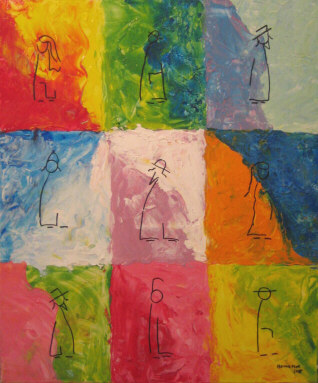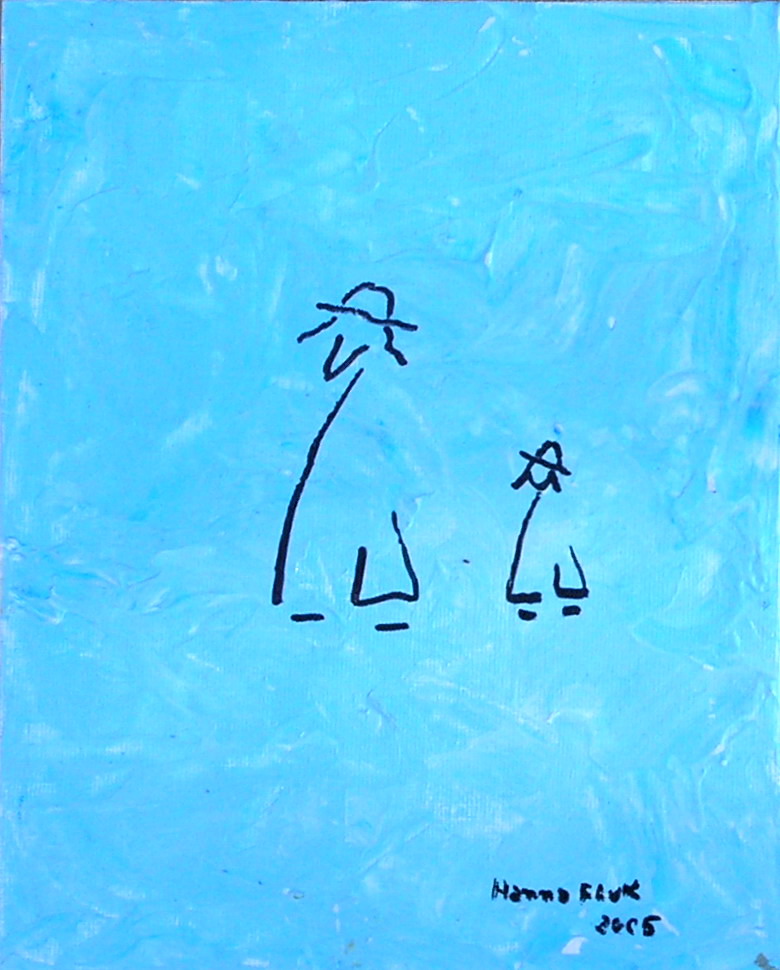 October 06
October 06
Parallel Worlds: Some Hasidic Tales
by Shaun Levin
p. 2 of 2
 I moved to London about ten years ago. I had lost hope in Israel and in the struggle for peace. I had been active in left-wing politics, in the days when it was considered radical to call for negotiations with the PLO, but I'd stopped believing there was a genuine desire for co-existence on both sides of the conflict. I felt the way my parents felt about South Africa when they took us to live in Israel in 1978: that Israel was not my country, that I couldn't make a home for myself in a place where I did not feel wanted, in a country that is not wanted. I wanted to get away from the burden of belonging that Israel imposes on its Jewish citizens.
I moved to London about ten years ago. I had lost hope in Israel and in the struggle for peace. I had been active in left-wing politics, in the days when it was considered radical to call for negotiations with the PLO, but I'd stopped believing there was a genuine desire for co-existence on both sides of the conflict. I felt the way my parents felt about South Africa when they took us to live in Israel in 1978: that Israel was not my country, that I couldn't make a home for myself in a place where I did not feel wanted, in a country that is not wanted. I wanted to get away from the burden of belonging that Israel imposes on its Jewish citizens.
Teaching English to haredim in North London was an entirely different experience. The Israel stories feel a bit like apparitions, images observed in an instance. My time with the students was an experience observed at length. There was physical contact, as well as a sense of equality; we were all Jews in the Diaspora. These men were eager to learn; they wanted to be fluent, write in cursive, and know the rules of the English language by the end of term. If I’d had the know-how and the resources to teach them, they would have retained everything. They were bursting with questions, impatient to know, as if language were a spiritual undertaking to bring them closer to God. They didn’t care about the mundane stuff.
I remember teaching them first-second-third, and drawing a picture of an Olympic podium on the white board. None of them knew what I was talking about, and they weren’t particularly interested when I explained my sketch to them. Most had never heard of the Olympic Games. I loved being around these men and their vibrancy; flirting with them, trying to shock them with my piercings, which intrigued them about as much as the Olympic Games did. I wanted to be in their group, to have the certainty they had, their hunger and passion.
I didn’t last long in the job. Whatever reasons I gave at the time, the truth was that I just couldn’t keep up. I couldn't provide them with knowledge at the rate that they wanted. As much as I loved being able to give them something, and their willingness to accept and engage, I wanted to be a part of them, not the odd one out. Not again.
But the physical proximity of their bodies, the four hours a week I spent in a room with them, exchanging learning and humour, changed something in me. I relished the moments when they walked into the room, took off their jackets and rolled up their sleeves. I loved the way their bodies became alive, supple -- no longer the stooped, rigid poses they assumed when I'd see them walking outside, hurrying, as if avoiding snipers.
Now I like walking amongst the haredimof North East London. I feel they are my people, not a separate entity. They are part of my messy and atavistic subconscious. I like buying donuts on Hanukah from their bakeries; chopped herring from their fisheries; farfel from their grocery shops. I notice, though, that I'm I’m saying “their” as if they’re split off from my real people, the ham-and-cheese-sandwich crowd.
This past year, right before Passover, I cycled up to Moishe’s Supermarket to buy matzo meal and red horseradish sauce. The first seder was the following day and the shop was packed with haredi men buying last minute ingredients. There were black coats everywhere, and a faint odour of unperfumed bodies. The men were chatting amongst themselves, talking on their mobile phones, urging their kids to decide already which chocolates they  wanted. I stood in the queue and smiled, probably not just to myself, because a little boy, all golden-haired and wavy blonde payes, looked up at me with a frown on his face. I smiled at him, and he – as if he’d done this before and it was no big deal – extended his chin towards me and spat. There were no more than a few raindrops of spittle, but the sound was very clear; it was the noise you make when your tongue vibrates between your lips. The father put his hand on the boy’s shoulder and pulled him towards him, apologising to me.
wanted. I stood in the queue and smiled, probably not just to myself, because a little boy, all golden-haired and wavy blonde payes, looked up at me with a frown on his face. I smiled at him, and he – as if he’d done this before and it was no big deal – extended his chin towards me and spat. There were no more than a few raindrops of spittle, but the sound was very clear; it was the noise you make when your tongue vibrates between your lips. The father put his hand on the boy’s shoulder and pulled him towards him, apologising to me.
“Chag sameach,” I said.
“Chag sameach,” he said, a split-second of surprise, smiling.
In recent pictures of Israel’s invasion of Lebanon, the cameras have focused on Israeli soldiers wearing tallitot and tefillin before going into battle. This turning to God may be indicative of a general loss of direction in Israel, or the proliferation of the religious right wing, or a way of returning to who we were. I don't remember such images from twenty years ago, when I served in Lebanon. All I remember is a general feeling of “What the fuck are we getting ourselves into?” - a feeling that came back to me with the force of a trauma relived when Israel decided, once again, that the conviction of others can be bombed out of existence. Perhaps the images of men in prayer shawls is just what the West wants to see: another battle in the war against Islam.
Then again, each time I go back to Israel it seems less and less Westernised to me. As much as it would like to be one, Israel does not feel like a Western country. It is part of the madness that is the Middle East, far from life in the Diaspora. But we are all looking for comfort -- me in the haredi neighbourhoods of London, and those terrified soldiers in the faith of the Orthodox. We are all on some level nostalgic for the ghetto, a nation defined by longing, not belonging. Being amongst the haredim in my London neighbourhood is probably the closest I'll ever get to being back in Port Elizabeth, Pesach time at the Summerstrand Shul with my first and second cousins there, my grandparents, my aunts and uncles, joking, gossiping, passing round my grandfather's snuff tin, praying in words that were still incomprehensible to me.
Shaun Levin is a writer based in London, and the editor of Chroma: A Queer Literary Journal.










